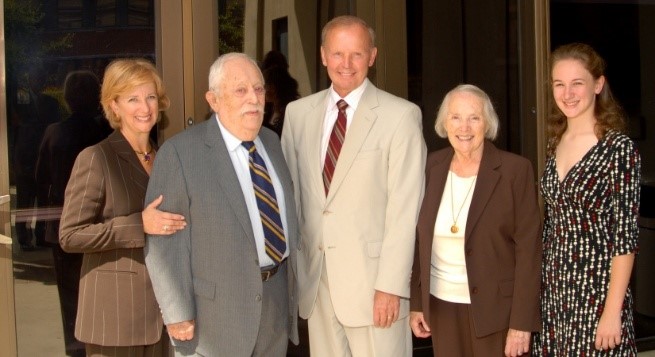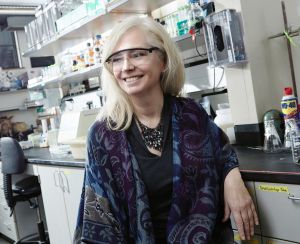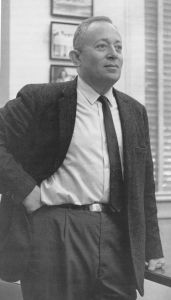The 2025 Witten Colloquium

November 13, 2025
1:00 pm in Murray G202
The Charles H. and Margaret M. Witten Chemistry Seminar Fund began in 1998. The purpose of the fund is to bring renowned chemists to campus to meet and interact with students, both graduate and undergraduate.
We thank Charles and Margaret Witten for their enduring generosity and commitment to education. Through the Witten Lecture Series, their legacy continues to inspire meaningful dialogue, scholarship, and leadership. We look forward to many more lectures that reflect the values they championed
Lecturer
Joan B. Broderick, PhD

Photo from Montana State University by Adrian Sanchez-Gonzalez.
Joan Broderick is Professor and Head of the Department of Chemistry and Biochemistry at Montana State University. She is a bio-inorganic chemist who studies how iron-sulfur clusters and S-adenosylmethionine are used by nature to initiate radical reactions essential to life. Other research interests include the biological assembly of complex metal clusters, and the trafficking, storage, and utilization of iron and sulfur in biology. Broderick holds a B.S. in Chemistry from Washington State University, and a Ph.D. in Inorganic Chemistry from Northwestern University, where she was an NSF graduate fellow in the lab of Tom O’Halloran and studied mechanistic aspects of the non-heme iron enzyme chlorocatechol dioxygenase. She was an American Cancer Society Postdoctoral Fellow with JoAnne Stubbe at MIT where she focused on mechanism of the coenzyme B12-dependent ribonucleotide reductase. Broderick held faculty positions at Amherst College and Michigan State University before moving to Montana State University in 2005. Her awards include the American Chemical Society Bader Award in Bioinorganic or Bioorganic Chemistry, the Saltman Award of the Metals in Biology Gordon Conference, the MSU Women in Science Distinguished Professorship, the MSU Presidential Medallion, the Illinois Distinguished Lectureship in Inorganic Chemistry, and the Calvin Lectureship at UC-Berkeley. She served on the Department of Energy Basic Energy Sciences Advisory Committee and the ASBMB Council, and she is an Associate Editor of JBC. She is a Fellow of the AAAS and a member of the National Academy of Sciences and the American Academy of Arts & Sciences.
Radical SAM Enzymes: Nature’s Choice for Radical Reactions
Radical S-adenosyl-l-methionine (SAM) enzymes catalyze diverse and challenging reactions across all life’s kingdoms. These reactions are initiated by transfer of an electron from a site-differentiated [4Fe-4S]+ cluster to a coordinated SAM, leading to homolytic cleavage of the S-C5′ bond of SAM. We have used time-resolved freeze-quench trapping coupled to EPR and ENDOR spectroscopy to demonstrate the progression of radical SAM reactions through sequential radical intermediates, and provided important clues to how Nature uses inorganic chemistry to harness, with exquisite regioselective and stereoselective control, the highly reactive 5′-deoxyadenosyl primary carbon radical for initiation of radical-based chemical transformations essential to life.
Dr. Charles H. Witten

Dr. Charles H. Witten was a distinguished chemist and educator whose academic foundation was deeply rooted in the University of North Carolina at Chapel Hill, where he earned his A.B., M.A., and Ph.D. degrees in Chemistry. His rigorous training at UNC Chapel Hill laid the groundwork for a career that spanned scientific research, military leadership, and higher education.
Early in his career, Witten worked as a research chemist for the General Printing Ink Corporation in Rochester, New York, applying his chemical expertise to industrial innovation. His scientific background became a strategic asset during his 22-year career in the U.S. Navy, where he served in both combat and planning roles, including as a radar officer and navigator—positions that required a deep understanding of physics and chemistry.
After retiring from the Navy, Witten transitioned to academia, serving as Professor of Naval Science and later Dean of Students at the University of South Carolina (USC). He earned an M.Ed. from USC, and later returned to UNC Chapel Hill to earn a second Ph.D., this time in Education, in 1978—demonstrating his lifelong commitment to learning and interdisciplinary scholarship.
Dr. Witten’s legacy is one of intellectual rigor, public service, and educational innovation—anchored by his formative years at UNC Chapel Hill, where his journey as a chemist began.
Past Lecturers
2016 Paul L. Modrich (Duke University)
2020 Not held due to Covid
2021 Not held due to Covid
2022 Akif Tezcan (UC San Diego)
2023 Scott Miller (Yale University)

